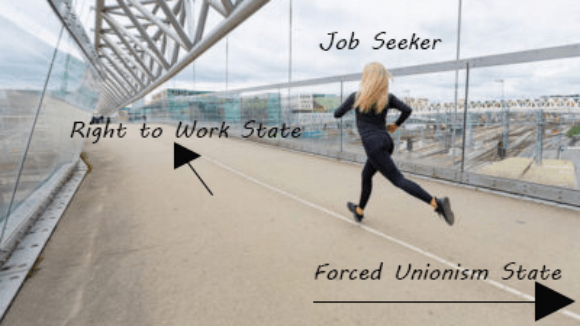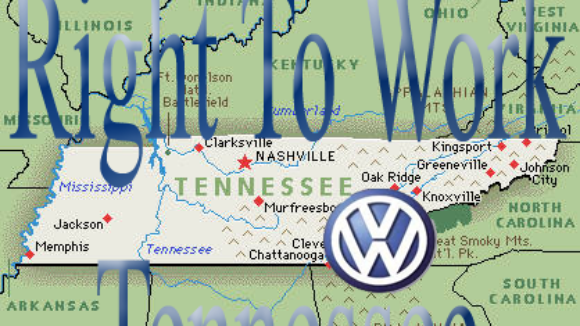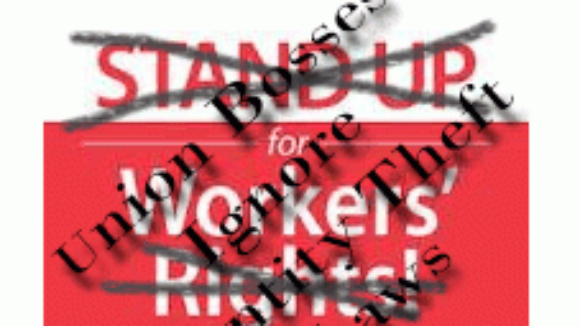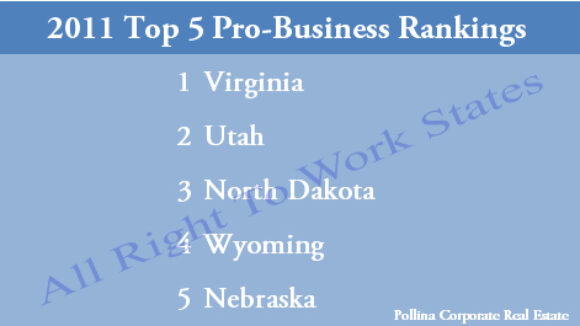Who Should Control Our Public Schools?
Why do teachers' unions across the country have the power to dictate the terms of school districts' reopening, while the tax dollars of parents [...] continue to flow towards those districts?

Why do teachers' unions across the country have the power to dictate the terms of school districts' reopening, while the tax dollars of parents [...] continue to flow towards those districts?

"A net total of roughly 212,000 tax filers moved from a forced-unionism state to a Right to Work state between 2018 and 2019."
S.B. 61, the New Hampshire Right to Work Bill, would free the individual employee to combat union boss mismanagement and corruption by wielding the power of the purse string.

Mississippi Governor Haley Barber exposes UAW’s anti-worker stance: Anyone curious about the actual motivations behind the United Auto Workers’ attempt to unionize southern automakers need only look to Chattanooga, Tenn., where the union is actively campaigning to organize the local…

Washington Examiner, Mark Mix is president of National Right to Work OpEd:. One November day in 2007, 33 AT&T workers in central North Carolina found out that their Social Security numbers and other private information had been posted for the world to see -- exposing them to identity theft and credit fraud. [media-credit name="The National Right to Work Committee®" align="alignright" width="227"][/media-credit]There has never been any doubt about who posted the workers' private information, but the perpetrators have now escaped justice. All the employees whose names and personal information were posted had exercised their freedom under North Carolina's Right to Work law to resign from membership in a labor union -- the Communications Workers of America, or CWA -- and cease paying union dues. In retaliation, the union bosses of CWA Local 3602 proved that they know no bounds when it comes to making workers toe the union line. When these workers exercised their right to refrain from union affiliation, they were subjected to an extended union campaign of workplace harassment and intimidation. After the workers exercised their Right to Work, CWA union official Judy Brown emailed a spreadsheet that contained the employees' personal data (including their Social Security numbers) to other CWA officials with instructions to "forward this information to your affected locals." CWA Local 3602 union president John Glenn posted the spreadsheet on a public bulletin board. Other CWA union officials likely disseminated the information through email and other means.
From Gary Glenn, Republican primary candidate for U.S. Senate in 2012: This is the only Labor Day we’ll have before the August 2012 primary election to spotlight the stark differences on union-related issues between contenders for the Republican nomination to take on Democratic U.S. Senator Debbie Stabenow. Depending on the outcome of our primary, the Republican nominee could be (1) a proven champion of state and federal Right to Work laws that guarantee employees the freedom to choose regarding union affiliation and help attract new jobs and industry, who can confront Stabenow for her opposition to Right to Work, or (2) a Republican who not only agrees with Stabenow’s opposition to Right to Work, but sponsored federal legislation that would expand union officials’ compulsory power and funnel hundreds of millions more compulsory dues dollars into Big Labor coffers. Recent polls indicate a majority of Michigan voters – including 82 percent of Republicans -- support Right to Work. Federal law guarantees employees in all 50 states the freedom to join and financially support a union if they choose. A state Right to Work law – such as already passed by 22 states -- would guarantee that Michigan employees are equally free to choose not to join or financially support a union without facing the threat of being discriminated against and fired either way. A national Right to Work law would guarantee that freedom to employees nationwide. Absent such protections, employees can legally be fired for choosing as a matter of conscience not to financially support a private organization that promotes causes the individual employee opposes. Passing Right to Work is also the single most dramatic step Michigan or America could take to attract new business and industry and successfully compete for new jobs in a global economy. Over the last decade, the top five job-producing states were all Right to Work states, and the 2010 Census reports that two-thirds of such states have higher per capita income than Michigan. The five states that lost the most jobs were all compulsory unionism states, with Michigan suffering the biggest job loss in America. In the ten years Debbie Stabenow has been in the U.S. Senate, Michigan has lost over 800,000 private sector jobs. With that backdrop, consider the stark difference between my record and that of former Congressman Pete Hoekstra: Before moving to Michigan in the 1990s, I served six years as executive director of the Idaho Freedom to Work Committee, leading the successful campaign to win legislative passage of a Right to Work law in 1985, followed by successfully defending the law in a November 1986 ballot contest despite being outspent 3-to-1. USA TODAY reported in 2007: "Idaho has been tops among states in economic growth since 2003. It has ranked high nearly every year since 1987, a run of good times unmatched by any other state…and has added jobs every year since 1987."

From the Richmond Times by NRTW President Mark Mix: Weathering an economic downturn is never easy, but some states are managing better than others. Despite the recession, Virginia boasts a modest unemployment rate, and its average hourly wages top the national mean. What's the Old Dominion's secret? One factor that sets Virginia apart from its less fortunate neighbors is the state's popular Right to Work law. Virginia's Right to Work law ensures that no employee can be forced to join or pay dues to a union just to get or keep a job. Protecting employee choice has always been the most important argument in favor of Right to Work, but Virginia's economic performance is another point for worker freedom. Recent studies from the Cato Institute and the National Institute for Labor Relations Research indicate that right-to-work states enjoy higher job growth and more disposable income (after adjusting for families' cost-of-living) than their forced-unionism counterparts. Eight of the top 11 states for wage and salary growth enjoy right-to-work protections. Meanwhile, 13 of the 14 worst performers lack right-to-work laws. Workers and their families are also voting with their feet: According to the National Institute for Labor Relations Research, the young adult population in forced-unionism states has basically stagnated since 1980. Virginia, on the other hand, continues to attract a stream of new workers and entrepreneurs. Protecting worker freedom also prepares states to handle a difficult recession better than their forced-unionism counterparts. Virginia's robust job and wage growth compares favorably with the sluggish performance of union-dominated states like Michigan, Illinois and Wisconsin.
"If we are serious about growing the economy and creating jobs, it is imperative that the Legislature pass right-to-work as soon as possible," opines New Hampshire State Rep. Gary Daniels. Daniels understands that his state can become a bastion of prosperity in the heavily taxed and over regulated Northeast, becoming a new haven for job creation -- if only the governor would get out of the way: Most state legislators hear regularly from our constituents about their top concerns. While the national debt and international engagements certainly carry a great deal of interest nationally, and balancing the budget without raising taxes or fees garners a lot of attention at the state level, by far the top issue remains creating good, new jobs and getting our economy growing robustly again. That's why it is so critical for New Hampshire to pass a law to become the 23rd right-to-work state and the only one in the Northeast. One of the major initiatives of this Legislature is creating and reestablishing pro-economic growth policies that are so critical for drawing businesses to the state and creating jobs, and then maintaining that environment so that businesses have the opportunity to succeed. Right-to-work is a major part of the puzzle. What is right-to-work? In short, it guarantees that no employee will be forced to join, or not to join a union, or pay dues or fees to a union, to get or keep a job. These days, finding steady employment is difficult for many people. However, it's simply unacceptable that anyone should be forced to pay dues or fees to a union to get or keep a job. How far we have strayed from the words of Samuel Gompers, the founder of the American labor movement, when he said, "The workers of America adhere to voluntary institutions in preference to compulsory systems, which are held to be not only impractical, but a menace to their rights, welfare and theirliberty," further noting that "no lasting gain has ever come from compulsion."

NRTW President Mark Mix from the Investor's Business Daily: In Wisconsin, union officials — with support from the Obama White House — continue to orchestrate illegal teacher strikes, lead angry mass protests at the state capitol and picket the residences of legislators to safeguard Big Labor's government-granted monopoly bargaining power over hundreds of thousands of Badger State public employees. Raucous union rallies and intimidation of elected officials and their families in support of Big Labor's purported "right" to unchallenged monopoly bargaining control are occurring in other states as well. Americans learning about organized labor's battles in Wisconsin, Ohio, Indiana and other states from TV, radio and newspaper reports may understandably be confused about what is at stake, especially if they have no personal experience with unions themselves. From afar, it's easy to draw the conclusion that public employees' right to join a union is at stake. But that is hardly the case. Public employees' freedom to join and pay dues to labor organizations is already legally protected across the U.S. and is not being challenged anywhere. What reform-minded elected officials are seeking to curtail, and in some cases even abolish, is government union chiefs' legal power to force public servants into a union as a condition of employment. Under the current labor laws of nearly half of the states, government union officials have been explicitly authorized to force all public employees in a workplace to pay union dues or be fired, as long as a majority of their fellow employees (among those expressing an opinion) support unionization. Such forced-unionism laws, which Big Labor is now fighting furiously to keep on the books in the face of increasingly intense public opposition, actually trample on, rather than protect, employees' freedom to make personal decisions about unionism.